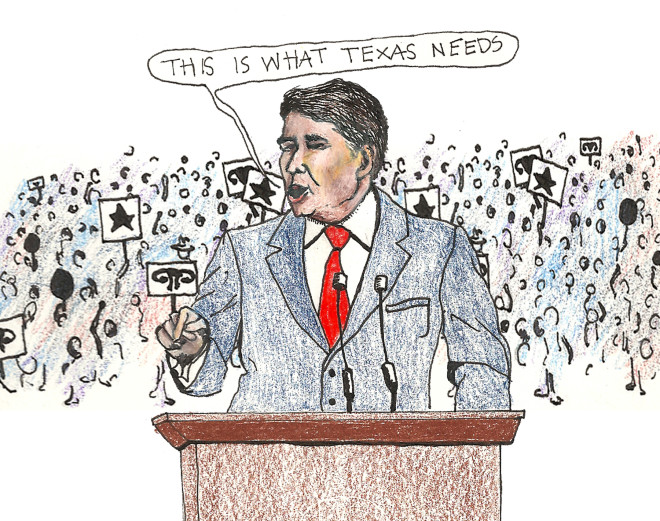“Representative” Government Merely a Suggestion in the Lone Star State

BY HANNAH WALDMAN
“Being a Texan means being alternately independent, rugged, individualistic, simple, straightforward, doggedly determined, and proud; sometimes boastful and brash, materialistic but moralistic; religious; distrustful of government yet respectful of authority; believing in competition and survival of the fittest, yet concerned for those who might be down on their luck.” This statement, published in in the Handbook of Texas Online, affirms what many non-Texans believe about the Lone Star State and its people’s homogenous conservative values. Yet, in the second most populous state in the country, it is unlikely that a catchall definition accurately describes the state’s diversity of people and beliefs.
But Texas’s diversity of people and beliefs is nothing new, and the state has a long history of discounting the voices of many. In 1845, the year the United States won the territory of Texas in the Mexican-American war, the state’s population held differing opinions on topics ranging from economic priorities to slavery. Recognizing these differences, the document granting statehood attempted to accommodate this by dividing the territory into five separate states, a recommendation that was considered more than once up until the 1930s. Unfortunately for many abolitionists and African Americans living in the region, the U.S. annexed Texas in 1846 as a slave state.
While slavery no longer exists as the subject of national debate, Texas’s historic disregard for its people manifests itself in the modern political landscape. For example, while abortion laws volley back and forth in state legislatures with few reaching consensus, Texas’s passage of Senate Bill 5, prohibiting abortions after 20 weeks of pregnancy, seems disconcerting when considering the divided opinions of Texans on the issue. Unlike the constituencies of states that have enacted similar bans in the past (Kansas, South Dakota, and Oklahoma), polls by Greenberg Quinlan Rosner Research showed that 63% of registered voters felt that, prior to the ruling, the state had enough restrictions on abortion and 68% consider it very or extremely important that women have access to family planning and birth control. According to these statistics, Governor Rick Perry’s plans to, “make abortion, at any stage, a thing of the past” make him a powerful ideologue, not a public servant. Yet, it is naïve to expect politicians, even those elected by the people, to not inject their own prejudices into politics. The issue of reproductive rights presents only one of many examples where the Texas government says one thing, while its people scream another. Polls by The Texas Tribune show that only 36% of Texans feel that their state legislative deserves reelection, while 45% of the population disapproves of the job Rick Perry has done as governor with 15% not taking a position.
The discrepancy between the people and their government exists as a result of flaws in the system itself. One such problem originates in the tight controls placed on the Texas Legislature. According to the Texas constitution, the legislature may meet for only 140 days over two years, unless the Governor calls a special session, which may last up to 30 days. By giving the executive branch this power, the state prevents the legislative body from ruling effectively by exempting itself from proper checks and balances. In addition to problems within the governing bodies, the state upsets voting procedures in order to receive the results it wants. Despite the recent states’ rights victory in removing a provision of the Voting Rights Act that required federal permission before changing voting procedures, Attorney General Eric Holder reinstated federal review in Texas on charges of discrimination. By shortening voting hours and requiring photo identification, the Texas government disenfranchised many minority voters, a group that historically votes blue. Further impairing fair voting processes, minority rights groups sued the Texas government, and won, on accusations that proved that Republicans engaged in gerrymandering during the 2010 redistricting process in order to garner more support.
While it’s tempting to place the blame entirely on the Texas government, the citizens of Texas are culpable for their insufficient representation as well. Compared to other states, Texas ranks 42nd in voter registration, 49th in the number of citizens who contact public officials, and 44th in the number of people who discuss politics a few times a week or more. Further giving testament to a total lack of involvement on the part of the people, Texans show similarly embarrassing rankings when it comes to volunteering, donating, and other measures of civic engagement.
At every step in Texas’s democratic process, beginning with the importance placed on voting to how votes translate in to governmental influence, the people’s voice sounds muffled by the government’s agenda, along with a healthy dose of their own apathy. Like all state governments, the Texas government embodies a representative, not direct, democracy. In order for it to function successfully, the people must actively participate by giving their voice to their elected leaders, with the belief, or more likely the hope, that they can trust them to deliver in their best interests. For the system to work as designed, both the citizens and the politicians must do their jobs honestly and to the best of their abilities.